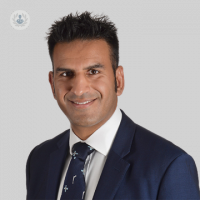Key FAQs about minimally invasive surgery
Written in association with:Minimally invasive surgery (MIS) has revolutionized the field of surgery, offering patients and surgeons numerous advantages over traditional open surgery. Here to explain more is esteemed consultant orthopaedic surgeon, Mr Al-Amin Kassam.

What is minimally invasive surgery?
Minimally invasive surgery encompasses a variety of surgical techniques designed to operate with the least amount of physical disruption. These procedures are performed using small incisions, often less than an inch long, through which a surgeon inserts specialized instruments and a camera, known as an endoscope or laparoscope, to visualise and operate on internal organs and structures. Common types of minimally invasive surgeries include laparoscopic surgery, arthroscopic surgery, and robotic-assisted surgery.
What are the main benefits of minimally invasive surgery?
- Reduced pain and scarring: Smaller incisions result in less trauma to the body’s tissues, leading to significantly less postoperative pain. Additionally, smaller scars are cosmetically more appealing and reduce the risk of wound complications.
- Shorter hospital stays: Patients undergoing MIS typically experience faster recovery times and shorter hospital stays compared to those who undergo traditional open surgery. Many minimally invasive procedures are performed on an outpatient basis, allowing patients to return home the same day.
- Faster recovery and return to daily activities: With reduced pain and shorter hospital stays, patients often resume their normal activities and return to work more quickly. This quicker recovery is a major benefit for those with busy lifestyles and responsibilities.
- Lower risk of infection and complications: The smaller incisions used in MIS reduce the risk of infection and other complications such as hernias. Additionally, less exposure of internal organs to external contaminants minimizes the chances of postoperative infections.
What are the most common minimally invasive procedures?
Minimally invasive techniques are utilized across a wide range of medical specialties. Some common procedures include:
- Laparoscopic cholecystectomy: Removal of the gallbladder through small incisions in the abdomen.
- Arthroscopy: Examination and treatment of joint issues, often used in knee and shoulder surgeries.
- Robotic-assisted surgery: Advanced robotic systems allow surgeons to perform complex procedures with enhanced precision and control. This is commonly used in prostate surgery and certain gynaecological procedures.
- Endoscopic surgery: Procedures such as colonoscopy and gastroscopy, which involve the examination and treatment of the gastrointestinal tract.
What does the future of minimally invasive surgery hold?
The field of minimally invasive surgery continues to evolve with advancements in technology and surgical techniques. Innovations such as robotic surgery, improved imaging systems, and enhanced surgical instruments are expanding the capabilities of MIS, allowing for even more complex and delicate procedures to be performed with minimal disruption to the body.
To consult with Mr Al-Amin Kassam today, head over to his Top Doctors profile.


